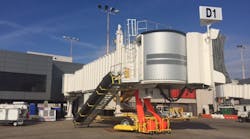Dabico A-Bridge Secures Contract for 12-Gate Multi-Year Passenger Boarding Bridge Replacement at BUF
Dabico, leading provider of innovative airport infrastructure solutions, is thrilled to announce that its flagship product, the Dabico A-Bridge, has been awarded a significant contract for the replacement of 12 gate multi-year passenger boarding bridges at Buffalo International Airport.
This project will also feature the integration of Dabico 400hz and PCA units, marking a comprehensive overhaul of critical airport infrastructure.
"We are delighted to have been selected by Buffalo International Airport and the entire NFTA Team for this transformative project," said Juergen Strommer, CEO of Dabico Airport Solutions. "This contract is a testament to the sustainability and reliability of our products and underscores Dabico's commitment to innovation in airport infrastructure."
The project represents a comprehensive solution provided entirely by Dabico Corporation, showcasing the seamless integration of Dabico's cutting-edge technologies to enhance airport operations and passenger experience.
"We extend our sincere gratitude to Buffalo International Airport and the NFTA Team for their confidence in our corporation," added Jason Summers, managing director of Dabico A-bridge. "We are eager to leverage our expertise and collaborative approach to deliver exceptional results that exceed expectations."
In addition to delivering top-tier airport infrastructure solutions, Dabico is proud to champion sustainability. Each fully renewed passenger boarding bridge (PBB) from A-Bridge contributes significantly to energy savings, environmental conservation, and decarbonization.
Decarbonization: Every PBB renewal saves 50 to 65 tons of CO2 emissions, mitigating environmental impact.
Environmental Impact: By not using 200 to 300 tons of coal and 100 to 150 tons of iron ore per PBB renewal, Dabico positively affects the environment and minimizes mining activities, thereby reducing air and water pollution.
Energy Savings: Each PBB renewal conserves 10,400 to 12,800 kilowatt-hours of electricity, further advancing sustainability efforts.








